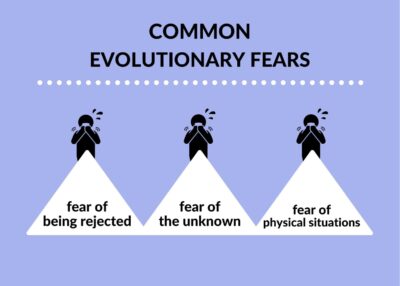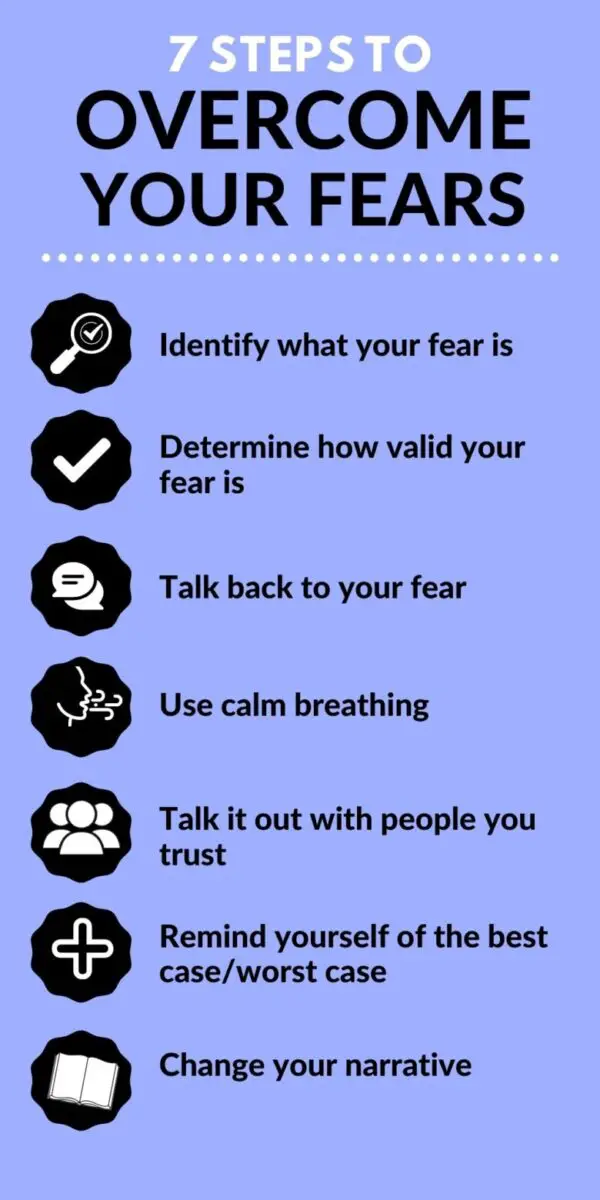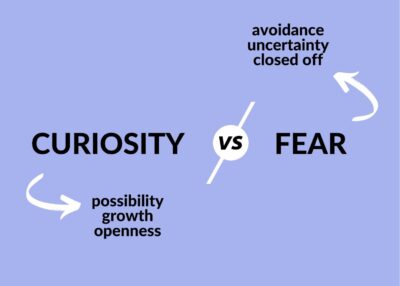Why learning how to face your fears and anxieties will help you reclaim your life.
Fear is perhaps the most necessary, most annoying part of life. We’ve all got fears, whether it’s a fear of the unknown, a fear of heights, or a fear of spiders. And while these fears affect us all differently, they usually share one consequence in common:
Our fears hold us back from living a fuller, richer life.
I used to be terrified of commitment. I would always find a reason not to commit to someone, even though I said I wanted a relationship. Even after I met my now-fiancé, I struggled to think long-term. (“I’m terribly in love with you, but like, let’s take it one day at a time, mmkay?”)
Had I not learned how to face my fears, I’d probably not be engaged right now.
Did my fears just disappear one day? Or did the perfect person suddenly make everything feel safe?
No, and no. (Much to my fiancé’s dismay.) That’s the thing about fear. It’s not like a visitor from out of town who comes and goes. Fear lives in your house – pretty comfortably, I might add – and plans to stay.
Learning how to face your fears isn’t about getting rid of your fears. It’s about learning how to identify them, embrace them, and move forward despite them.
I’ve got a ton of fears, and I bet you do too. Most of us do. Fortunately for us, we can refuse to let fear hold back our lives.
.
Where does fear come from, and why is it so hard to face your fears head-on?
Fear is deeply rooted in our evolutionary DNA. Back in prehistoric times, we needed fear to survive. Without fears, we probably would’ve made some poor decisions. (Oh, hello deadly Saber Tooth Tiger. I think I’m going to run away from you now.)
When we feel fear, we receive a surge of adrenaline in our body that puts us into a fight-or-flight-or-freeze mode. Our heart pumps more blood to our muscles, so we’re ready to face whatever enemy there is.
You can generally trace most of your fears back to our evolutionary survival needs.
-
Fear of being rejected by others
We used to depend on social groups to survive. This need for belonging never went away, even though our livelihood generally doesn’t depend on others. As a result, we’re terrified of being rejected, not fitting in, or missing out on opportunities that would create stronger bonds. We’re wired to evaluate social hierarchies and instinctively compare ourselves to others. Most of your social fears stem from this deeply-rooted need for belonging.
-
Fear of the unknown
Some scientists claim that this is our most pervasive fear, and they might be right. Anything unknown represents potential danger. Humans like to be in control. (Except for me. I don’t care about control at all, nope, nada. I love uncertainty and depending on others.) We typically default to something we know and are familiar with, even if it’s not the best for us.
-
Fear of physical situations like heights, flying, spiders, rollercoasters, etc.
It doesn’t take a rocket scientist to figure out that these fears stem from survival instincts. Even if we rationally know situations are safe, our adrenaline kicks in when we think we might be in danger.
.
Why It’s Important to Learn How to Face Your Fears and Anxieties
If fear is rooted in our ability to survive, why is it important to learn how to face your fears and anxieties?
While our fears are meant to help us, they tend to have the opposite effect. A primary reason is that they’re a bit outdated. While our physical reaction to fear is mostly the same as prehistoric times, our modern world is quite different. Non-life-threatening things have replaced the life-threatening enemies of the past.
For example, feeling afraid to speak up at work won’t kill you. But your body might react like it will, making you much less likely to take risks or step up.
Some fear is still reasonable. It’s important to listen and evaluate when things might actually be dangerous or harmful to you or others. But most of what we’re afraid of doesn’t serve us.
Instead, fears make us avoid things that we want to do. We limit ourselves when we give in to our fears. As a result, we limit our lives.
Elizabeth Gilbert writes in her bestseller Big Magic: “Without bravery, their lives would remain small – far smaller than they probably wanted their lives to be.”
.
How to Face your Fears and Anxieties
1. Identify what your fear is
You’d think we’d understand our fears because they play such a significant role in our decision-making. Ironically, this isn’t the case. Our fears are so deeply rooted in our wiring, we often don’t even realize what they are. Our emotional brains and bodies react before we even think about it.
Before anything else, you need to identify your fear. Name it, and then name the influence it’s having on you. Regardless of how obvious it might seem, giving your fear a name will instantly take away some of its power.
2. Determine how valid your fear is
Once you name your fear, you’ve got to determine if it’s valid. Remember, a lot of our fear responses are designed for prehistoric threats that no longer exist. For example, you might feel terrified to try something new. Your body is saying, “Danger! Danger!” But is it really dangerous?
While the fear we feel is real, that doesn’t mean the catalyst for fear is. Ask yourself if your fear serves you. Is it a legitimate fear, or would you be able to survive?
3. Talk back to your fear.
Most people try to make their fears go away – and therein lies the problem. We can’t merely eradicate our fears. They’re not going anywhere. That’s why, as you learn how to face your fears head-on, you must learn how to talk back to your fear.
Talking back might sound silly, but it’ll change your life. You can have the conversation in your head, out loud, or in a journal. Whichever method you choose, you must develop a tone around, “I hear you, fear, I acknowledge your presence, but I think you’re wrong, and here’s why.”
If it helps, give your fear a nickname or personality. (If this sounds a little too “woo woo” for you, you can be more traditional. “My fear is not valid and is wrong because…”)
4. Use calm breathing
Fear and anxiety spike our adrenaline levels, which results in rapid breathing and tense muscles. Our bodies “activate.” (Imagine it like superheroes, only less cool.) When overcoming our fears, we must calm our bodies down and get them out of this state.
Taking deep, calming breaths is entirely the opposite of our body’s anxiety response. In fact, you can’t breathe deeply while in an activated state. When you’re feeling your fears come up, force yourself to take deep, slow breaths. It might not be easy at first, but you will improve with practice and mindfulness.
5. Talk it out with people you trust
Fear, and most notably shame, always gets bigger if left alone in our heads. If we give fear free reign, it will grow, expand, and take on a new shape of its own. Have you ever felt your fears spiral or begin to merge?
Talking about your fear is crucial for overcoming your fears. Now, you shouldn’t start chatting about your fears with anybody. (That’s not what vulnerability is.) Still, when you get vulnerable with people you trust, they can offer you outside reason and support that you can’t provide to yourself.
6. Remind yourself of the best case/worst case
When fear consumes us, it distorts our perception of the situation at hand. Our anxieties often make us believe we’re thinking productively of the future. In reality, our minds loop in spirals that aren’t productive nor grounded.
Sometimes it’s helpful to ground your fear in real possibilities. Consider the worst-case scenario. Can you survive it? Also, remind yourself of the best-case scenario. What makes you inspired to overcome this fear? Is the potential benefit worth the potential disappointments? Turning the situation into a pro-con, logical decision will limit the influence of your fear.
7. Change your narrative
Finally, the best thing to learn how to face your fears head-on is to change your narrative. Your fears aren’t going anywhere, nor is the uncertainty of life. Learn how to embrace your fears for what they are: outdated biological reminders that sometimes help you and sometimes don’t.
When you work to overcome your fears, you might end up with a bad outcome. Instead of viewing this as the worst, focus on what you learned from the experience. Fear gives you opportunities to challenge yourself, get out of your comfort zone, and grow. In doing so, you can live a richer, more profound life.
.
Why Curiosity and Fear Are at Odds: Overcoming Fear
If you’ve ever gone down an anxiety spiral, you know that it’s filled with questions. What will happen? What if this happens? What if this leads to this leads to this? You might think that these questions are helpful. After all, questions expand our thinking.
Unfortunately, fear-based questions can do more harm than good.
This statement might sound surprising coming from a blog literally called MyQuestionLife. Here’s the thing, though. Questions unlock possibility and meaning in our lives – if we ask the right ones.
When our questions are rooted in fear, we’re not actually curious. Instead, we’re trying to avoid or predict outcomes that we don’t want.
Curiosity is about opening yourself up to the possibility of questions. You seek answers with a genuine desire to listen, learn, and grow. Uncertainty becomes potential, not dangerous.
As you learn how to face your fears and anxieties, try to adopt a curious mindset. Not only will it help you overcome fears, but it can expand your life in so many ways.
[/fusion_text][fusion_code]PGlmcmFtZSBpZD0iaW50ZXJhY3RBcHA1ZmJmYjY0Zjc3YjU1MTAwMTZhZTliZWEiIHdpZHRoPSI4MDAiIGhlaWdodD0iODAwIiBzdHlsZT0iYm9yZGVyOm5vbmU7bWF4LXdpZHRoOjEwMCU7bWFyZ2luOjA7IiBhbGxvd1RyYW5zcGFyZW5jeT0idHJ1ZSIgZnJhbWVib3JkZXI9IjAiIHNyYz0iaHR0cHM6Ly9xdWl6LnRyeWludGVyYWN0LmNvbS8jLzVmYmZiNjRmNzdiNTUxMDAxNmFlOWJlYS9xLzE/bWV0aG9kPWlmcmFtZSI+PC9pZnJhbWU+[/fusion_code][fusion_text columns=”” column_min_width=”” column_spacing=”” rule_style=”default” rule_size=”” rule_color=”” content_alignment_medium=”” content_alignment_small=”” content_alignment=”” hide_on_mobile=”small-visibility,medium-visibility,large-visibility” sticky_display=”normal,sticky” class=”” id=”” font_size=”” fusion_font_family_text_font=”” fusion_font_variant_text_font=”” line_height=”” letter_spacing=”” text_color=”” animation_type=”” animation_direction=”left” animation_speed=”0.3″ animation_offset=””]
Conclusion: How to Face Your Fears and Anxieties
We all have fears in our lives, whether they’re big or small. And whether we like to admit or not, these fears often hold us back from things we care about. Fear keeps our lives small.
By learning how to face your fears, you can open your life to greater possibilities and experiences. This process doesn’t happen overnight. Still, with the right strategies and practice, you can learn how to overcome your fears and anxieties.
- Identify what your fear is
- Determine how valid your fear is
- Talk back to your fear
- Use calm breathing
- Talk it out with people you trust
- Remind yourself of the best case/worst case
- Change your narrative
If I’ve convinced you about the importance of curiosity, subscribe to receive more questions and a free self-awareness course filled with questions.








My greatest fear is fear of falling. Since my accident I have worked hard to improve my balance and use my walker to the best of my ability. However falling is always in the back of my mind. I take deep breaths and talk to myself and tell myself I can do this. But it’s an ongoing fear
Positive thinking is one important thing for overcoming the anxiety. When the patient was in a fail, she should think the positive. She may not hopeless and always think that tomorrow will be her fail again. When she feels this more and more it will be dangerous for her. She should take her bad experience to get the better life.
A person with anxiety usually feels afraid of something that actually it fears because of her own feeling. When you want to help her, you should ensure her that what she afraid is not necessary the case. She should be brave to make a better decision.
Sitting and doing nothing is not a good thing for the anxiety people. When she feels sad, nervous, and uncomfortable she should do something positive to do. It is very important for overcoming the anxiety feeling.
Correcting any mistakes in the past and try to make everything better is effective enough to overcoming the anxiety feeling. It will help her feel more relax and the mind becomes tranquil.
Telling every problem is also an effective way to help the patient for overcoming the anxiety. It really helps to ease the burden on the mind. The most important is she has to find someone who can be trusted and really make her feels comfort.